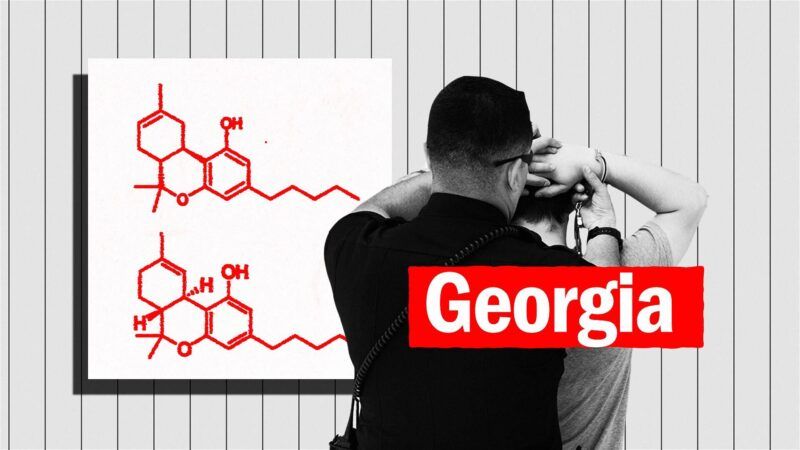Georgia Cops Crack Down on Vape Shops for Selling Legal Products
In Georgia, the difference between delta-8 and delta-9 THC is the difference between legal and illegal, but police are threatening store owners over both.

Since January, vape shops all across northwest Georgia have received threatening letters from law enforcement. In Catoosa County, the letter came from Sheriff Gary Sisk, while stores in the three counties surrounding Catoosa received letters from the Lookout Mountain Judicial Circuit Drug Task Force (LMJCDTF), which has jurisdiction in all four counties. The letters from the task force were addressed to "all individuals, retailers, distributors, and wholesalers," who were advised that anyone caught "in possession and/or selling/distributing" any products containing "any form of THC that is over 0.3%…will be subject to arrest, prosecution and possible asset seizure."
The letter from Sisk was even more pointed: Shops were advised that "a representative of the Catoosa County Sheriff's Office" had "purchased items from your store and had them tested." The items were found to "contain a significate [sic] level of Delta 9." Sisk warned that the sheriff's office would "move forward with prosecutions and seizures if these illegal items are not removed from Georgia" by April 30.
But the shop owners insist that their products are completely legal, and that they have the documentation to prove it.
Delta-9-THC is the main psychoactive ingredient in cannabis, which creates the "high" from marijuana use. Federal law caps the amount of delta-9 in a substance at 0.3 percent. But loopholes in the law led to an explosion of investment in delta-8-THC, a cannabis byproduct that can be synthesized from hemp, and which produces a similar, though less potent, reaction than delta-9. The 2018 Farm Bill legalized hemp derivatives, and a Georgia law passed the following year specifically mentioned "all [hemp] derivatives, extracts, cannabinoids, isomers, acids, salts, and salts of isomers." Even though neither mentions delta-8 specifically, it is implied in each case to be included.
For Joe King and Leigh Ann Laduke, owners of The Shoppe in Catoosa's Fort Oglethorpe, the letter was a shock. According to King, they have "all the certificates of analysis" showing that their products contain delta-8, and not delta-9. But when they reached out for clarification on which items were found to be in violation of the law, the sheriff's office refused to specify. In response to Reason's request for more information under Georgia's open records law, Chief Deputy Kelly Holcomb similarly replied that the information was "exempt and protected from disclosure," citing the law's exception regarding "any pending investigation or prosecution of criminal or unlawful activity." With threats of arrest but no clarification, King and Laduke felt they had no choice but to remove all CBD products from their shelves.
Confusion over the legality of CBD and THC has persisted in recent months. In January, Patsy Austin-Gatson, the district attorney of Gwinnett County, which includes part of Atlanta, announced that she would be prosecuting stores and store owners for selling delta-8 products. She said the products were "not legal," and violators would be "subject to felony punishment" and "at risk of having their assets seized and forfeited to the state." Last month, attorneys from the law firm Pate, Johnson and Church filed a lawsuit against the state of Georgia and Austin-Gatson on behalf of two vape stores, seeking a declaration that delta-8 products are not illegal under either state or federal law. A judge recently granted an injunction against Austin-Gatson on the basis of "a substantial likelihood that the Plaintiffs will prevail on the merits of their claims at trial," and in recent weeks, officers in the counties of Gwinnett and Madison had to return delta-8 products they had seized from stores.
Tom Church, an attorney on the case against Austin-Gatson (and who is not affiliated with the stores in northwest Georgia), told Reason that while shop owners like King and Laduke face an uphill battle, the law is on their side: Even pending a positive outcome of the Gwinnett case, a successful prosecution would require demonstrating "criminal knowledge" that a defendant knowingly bought or sold an illicit substance.
The letters from the drug task force warned, "Please do not rely on the statements of individuals, retailers, distributors, or wholesalers to the legality of a product." The Sisk letter similarly cautioned, "These products are being misrepresented by the manufacturers and contain more than what is on the label… It is your responsibility to know what you are selling and what it contains especially when I am telling you it is a violation of Georgia Law."
In fact, according to Church, if shop owners purchased products with documentation showing that they were legal, then they have done their due diligence. Further, he says, the type of drug test available to most local law enforcement agencies may be able to detect THC, but often "doesn't differentiate" well enough to tell delta-8 from delta-9.
But for now, shop owners have few options but to comply. Faced with the prospect of prosecution and potential seizure of their entire livelihoods, The Shoppe is erring on the side of caution. Laduke tells Reason that she refers to their regular customers as "patients," people who use the store's products to cope with "pain, anxiety, PTSD," as well as opioid addicts and alcoholics who use delta-8-infused CBD to help curb their withdrawal symptoms. She worries that while the store is losing out on money from CBD sales, their customers are losing out on access to products that had provided them relief.


Show Comments (16)